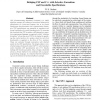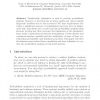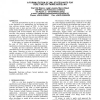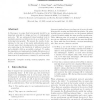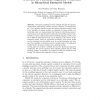145 search results - page 13 / 29 » The use of random simulation in formal verification |
MEMOCODE
2003
IEEE
14 years 27 days ago
2003
IEEE
CSP (Communicating Sequential Processes) is a useful algebraic notation for creating a hierarchical behavioural specification for concurrent systems, due to its formal interproces...
ASM
2010
ASM
14 years 23 days ago
2010
ASM
Traditionally, simulation is used to perform probabilistic analysis. However, it provides less accurate results and cannot handle large-scale problems due to the enormous CPU time ...
UML
2001
Springer
14 years 2 days ago
2001
Springer
The work presented here is part of a project that aims at the definition of a methodology for developing realtime software systems based on UML. In fact, being relatively easy to ...
IJNSEC
2007
13 years 7 months ago
2007
In this paper, we argue that heterogeneity should be an important principle in design and use of cryptographic protocols. We use automated formal analysis tools to randomly genera...
CAISE
2006
Springer
13 years 11 months ago
2006
Springer
Enterprise modeling involves multiple domains of expertise: requirements engineering, business process modeling, IT development etc. Our experience has shown that hierarchical ente...
